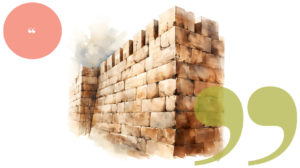AdviceLine, Issue 134
| March 18, 2009Preparing for Yom Tov is a zechus that applies to the entire family
My life is very hectic. I’m the proud mother of nine, and also work full time. With Pesach around the corner, I have a crushing amount to do and simply can’t manage it alone. My husband is an accountant who will be working until the very last minute. My three oldest children are all boys. They’re serious learners and often learn two full sedarim during bein hazmanim. I’m very proud of them and would love for them to be able to learn as much as possible. However, I’m also desperate for help and can’t afford to pay someone to do the jobs I’d give them. The boys are willing to give me as much help as I need, but I find myself battling a lot of guilt. How do I find the balance between utilizing their help and not causing bitul Torah (not to mention leaving them a little time just to enjoy bein hazmanim)?
Rabbi Ilan Feldman:
First, take a moment to catch your breath and fully appreciate that your challenges are based on the fact that you have more brachah than you can handle: jobs for two heads of household, many children, and sons seriously involved in Torah study. May we all be so challenged!
If I’am reading your submission correctly, the only problem you have is your own guilt in asking for help. Allow me to attack that guilt.
It’s clear that your home is based on Torah study, since not only are the boys involved in serious and “optional” limud haTorah, but their mother is proud of and encourages it. This means that the reason you work full time is to support a family whose focus is “Torah and avodah.” It is therefore not at all a detraction from their Torah study if your sons take off time to make the life of their mother, who works to enable them to study Torah, a bit more bearable.
You write that the boys aren’t opposed to helping, but you’re hesitant to ask because of their learning. Give your future daughters-in-law a wonderful gift — ask your sons for help, and allow them to figure out how to balance their bein hazmanim learning commitments with their obligation to get the house ready for Pesach. They have no more or less an obligation to get their household ready for Pesach than you do. Women do themselves and their families a disservice when they relate to Pesach preparation as “their problem” for which they “ask for help.” Preparing for Yom Tov is a zchus that applies to the entire family. We are all familiar with stories of gedolim who spent hours searching for chometz the night before Pesach. Couldn’t they have spent the time learning instead, and assigned the search to someone else?
Kashering a kitchen so Pesach can be experienced properly is a tremendous mitzvah. If you saw it that way, you’d probably resist it less, be less stressed, and more open to “sharing the effort.” You’re not asking for a favor; you’re sharing a holy family project with partners.
True bnei Torah know that they’re not absolved of the mitzvah of preparing for Pesach, nor do they want to be. If they are masmidim who love learning, they’ll plan their day so that they can continue with their learning, get some rest, and spare their hard-working mother the feeling of loneliness and abandonment too many women are allowed to feel. Do not deprive your children of the opportunity to be fully developed in Torah and avodah and gemilus chasadim by “sparing” them the need to participate in Pesach preparations.
Rabbi Ilan Feldman is the son of Rabbi Emanuel Feldman, a sage of the American rabbinate and a well-published author: son in-law and talmid of Rav Shmuel Yaakov Weinberg, ztz”l; and Rav of Congregation Beth Jacob in Atlanta, Georgia. The families who are part of his vibrant, dynamic community regularly turn to Rabbi Feldman to receive his wise counsel on both halachic and interpersonal issues.
Rebbetzin Neustadt:
You’re asking a very important question! You’re torn as you try to minimize the bitul Torah of masmidim and prepare a house for Pesach while dealing with time and money constraints. Your confusion brings you to guilt.
But why guilt? Hashem gave you the children, He gave you and your husband demanding jobs, He gave you your financial reality, and He gave you Pesach. Your life is exactly as He wills it be. And your sons’ situation is also exactly as Hashem wants it.
Keeping all this in mind, the first step is to humbly lift your eyes to Hashem in sincere prayer. “Hashem, You know my love and desire to see my sons grow in Torah with a healthy balance of Torah and derech eretz. We’re both working and have a large family to care for. Hashem I trust that You allow me to avail myself of a helping hand from my beautiful sons, for otherwise You would have given me the money, time, or other resources with which to prepare for Pesach.” Daven until you are sure that all that’s in your heart has been discussed. Realities are sent by Hashem so that we turn to Him.
What Hashem desires from us can be found within the Torah. In your situation, there are a number of ideas and principles to keep in mind. 1) “Chayecha kodmim,” your life takes precedence. Know your boundaries and don’t overwork; 2) Understand that the mitzvah of biur chometz is incumbent on every household member over bar mitzvah, as is kibud av v’eim; 3) Be clear on what must be done halachically — no spring cleaning on yeshivah boys’ account.
Once you’ve internalized these three ideas, there are some practical ways to make this easier for everyone involved. Be pleasant and communicate your appreciation to your sons at every juncture. Be available to guide them as to how to do things best so no time is wasted. If you work full time, then giving clear instructions each night regarding the next day’s jobs may be your best option. And it’s very important to make sure there’s nourishing food ready so that as soon as they’re done cleaning, they can eat and go learn.
Last, try to relax. Hashem gave you not only your situation, but also the mitzvah of educating your sons. They will undoubtedly grow from this experience. This mixture of Torah and derech eretz, and the working on their middos that it necessitates, will stand by them later in life.
Rebbetzin Yitty Neustadt is the daughter of Rabbi Ezriel Tauber and wife of a well-known posek and Rav in the Neve Yaakov neighborhood of Yerushalyim. She teaches at the Shalheves seminars run by her father, and lectures across the country. Her crystal-clear hashkofos and positive messages have transformed the lives of thousands of woman.
Rabbi Yisroel Fabian:
With Pesach rapidly approaching, many of us can empathize with your dilemma. The truth is that we all regularly face the issue of balance and bitul Torah, as we constantly have to choose between different possible ways of using our time, and correspondingly, our money.
Ultimately, we are looking to do G-d’s will and the question, “What does Hashem want from me?” is central to our lives. The difficult part is knowing the answer at any given moment.
To determine ratzon Hashem in your situation, you (and your husband) should ideally consult with your Rav. (If you don’t have a Rav then you should get one, as the mishnah in Avos teaches us, “Make for yourself a Rav.”) Below I give some general guidelines and ideas based on the information you provided.
In halachah, there’s a general rule that one involved in a mitzvah is free from doing another mitzvah if the two are mutually exclusive. Interestingly, this rule does not apply to the mitzvah of Talmud Torah. One explanation for this omission is that the purpose of learning is in order to act. Therefore, refraining from doing a mitzvah that can’t be done by someone else because one is learning Torah, undermines the very purpose of learning. Bitul Torah only comes into play when one could learn, and doesn’t.
Rav Shlomo Wolbe, ztz”l, told a beautiful and elucidating story about Rav Avraham Grodzensky, Hy”d, mashgiach of Slabodka. Tragically, his wife passed away at a young age leaving Rav Grodzensky to care for his young children. Someone asked if it bothered him that he would now have to devote so much time to raising his children and to the “mundane” activities that his wife had previously handled, instead of learning and teaching. He responded that when his wife was alive his avodas Hashem took one form, and now that she wasn’t, his avodas Hashem took a different form, but it was the same avodas Hashem. His job was to serve Hashem in whatever way Hashem chose for him.
Preparing and cleaning for Pesach is part of our avodas Hashem at this time of year.
Many bochurim learn morning seder, and part of the evening, if possible, leaving them available to help in the afternoon. If this amount of time isn’t sufficient to prepare for the holiday — not to spring clean — then the mitzvas hayom of preparing for the holiday takes precedence. The boys should have some time to enjoy ben hazmanim before Pesach; however, they will mainly have time for this during the holiday and the week after.
In addition, cleaning for Pesach does not have to be total bitul Torah. There are a myriad of shiurim on tape, and cleaning time can be used to learn about things one normally might not have the time for.
Guilt is an appropriate emotional reaction to doing something wrong; it spurs us to correct our actions and change. Guilt is inappropriate when we haven’t done anything wrong, when we use it to beat ourselves up and/or when it hinders our ability to function and change. It’s okay to feel a little sad at having to take your sons away from their learning; however, it is inappropriate to feel guilty since you have or will be seeking rabbinic guidance on how to act in accordance with the ratzon Hashem.
Rabbi Yisroel Fabian MS, CPC, CGE is the one of the Roshei Yeshivah of Orchos Chaim in Jerusalem, a counselor, and a personal and executive coach.
(Originally featured in Family First, Issue 134)
Oops! We could not locate your form.











